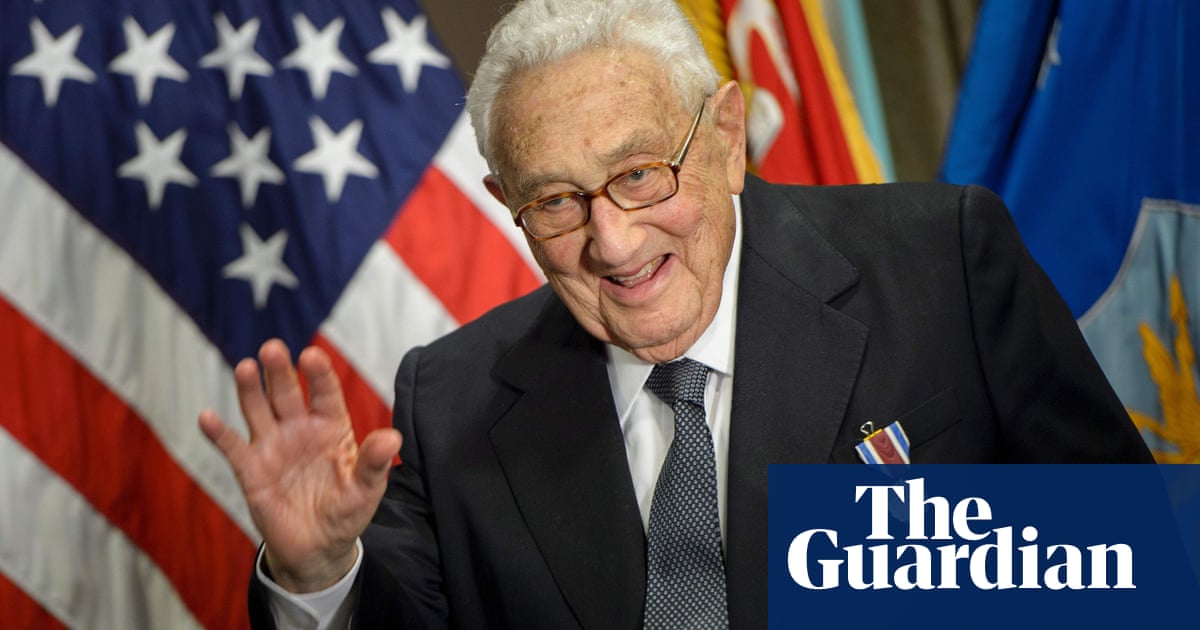
Henry Kissinger, the former secretary of state under Richard Nixon who became one of the most prominent and controversial figures of US foreign policy in the 20th century, has died. He was 100.
His consulting firm Kissinger Associates announced hisdeath in a statement on Wednesday evening, but did not disclose a cause.
A giant of the Republican party, Kissinger remained influential until the end of his life, in large part thanks to his founding in 1982 of his geopolitical consulting firm based in New York City, and the authorship of several books on international affairs.
Kissinger was a Harvard academic before becoming national security adviser when Nixon won the White House in 1968. Working closely with the president, he was influential in momentous decisions regarding the Vietnam war including the secret bombing of Cambodia in 1969 and 1970. That was part of what Nixon called the “madman theory”, an attempt to make North Vietnam believe the US president would do absolutely anything to end the war.
As secretary of state, Kissinger did achieve peace in Vietnam, although not before initiating a heavy bombing campaign at Christmas 1972, while talks continued.
He survived Nixon’s downfall in the Watergate scandal and served Gerald Ford, leaving government after Jimmy Carter’s election win in 1976. Kissinger’s policy towards the Soviet Union was not confrontational enough for the Reagan administration, precluding any thought of a 1980s comeback.
On the political and intellectual right and left, Kissinger’s legacy differs.
On the right, he is seen as a brilliant statesman, a master diplomat, an exponent of power politics deployed to the benefit of America, the country to which his family fled on leaving Germany in 1938.
On the left, hostility burns over his record on Chile, where the CIA instigated the overthrow of Salvatore Allende; on Pakistan, where he and Nixon turned a blind eye to the slaughter of hundreds of thousands; on the Middle East; on Cyprus; on East Timor and more.
In the early 2000s, Kissinger supported the administration of George W Bush in its invasion of Iraq. Another supporter of that war, the journalist Christopher Hitchens, wrote that Kissinger should be tried for war crimes.
In fact, for negotiating the Paris treaty which ended the Vietnam war, Kissinger and Le Duc Tho were awarded a shared Nobel prize, although the North Vietnamese negotiator refused to accept the honour. The accolade prompted the the singer-satirist Tom Lehrer to respond: “Political satire became obsolete when Henry Kissinger was awarded the Nobel peace prize.”
Kissinger made an appearance in Siege, Michael Wolff’s Trump exposé which was published in 2019. According to Wolff, Kissinger regularly advised Jared Kushner. At one point, the book said, Donald Trump’s son-in-law and senior White House adviser even suggested that Kissinger, well into his 90s, should return as secretary of state.
His firm said on Wednesday he died at his home in Connecticut and would be interred at a private family service, and that there would be a memorial in New York at a later date.
More details soon …
https://news.google.com/rss/articles/CBMiZWh0dHBzOi8vd3d3LnRoZWd1YXJkaWFuLmNvbS91cy1uZXdzLzIwMjMvbm92LzI5L2hlbnJ5LWtpc3Npbmdlci1kaWVzLXNlY3JldGFyeS1vZi1zdGF0ZS1yaWNoYXJkLW5peG9u0gFlaHR0cHM6Ly9hbXAudGhlZ3VhcmRpYW4uY29tL3VzLW5ld3MvMjAyMy9ub3YvMjkvaGVucnkta2lzc2luZ2VyLWRpZXMtc2VjcmV0YXJ5LW9mLXN0YXRlLXJpY2hhcmQtbml4b24?oc=5
2023-11-30 02:41:00Z
2647269533
Tidak ada komentar:
Posting Komentar